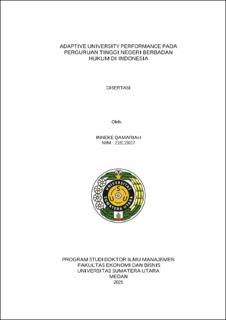Adaptive University Performance pada Perguruan Tinggi Negeri Berbadan Hukum di Indonesia
Adaptive University Performance at State Universities with Legal Entities in Indonesia

Date
2025Author
Qamariah, Inneke
Advisor(s)
Lumbanraja, Prihatin
Absah, Yeni
Silalahi, Amlys Syahputra
Metadata
Show full item recordAbstract
In response to the rapid changes in higher education, State Universities with
Legal Entity (PTN-BH) status in Indonesia continue to exhibit a gap in
comprehending the primary factors contributing to adaptive university
performance, particularly in the context of leadership, academic networking, and
individual characteristics within the university environment. This study aims to
analyze the influence of supportive leadership, social networking capabilities, and
openness to experience on adaptive university performance, with collaborative
experiential learning as a mediating variable and cultural intelligence as a
moderating variable. This research employs a quantitative approach using a
survey method to collect data from 340 deans across 21 PTN-BH in Indonesia,
with a final sample of 183 respondents selected using proportionate random
sampling. Data were processed using Structural Equation Modelling-Partial
Least Squares (SEM-PLS), incorporating Importance-Performance Map Analysis
(IPMA) to identify key influencing factors that remain underutilized, as well as
Multi-Group Analysis (MGA) to compare the effects across PTN-BH in Java and
non-Java regions. The results revealed that in order to improve collaborative
learning experience within PTN-BH, it is required to have a good leader support,
social networks capabilities, and openness to new experience. In addition, the
dean's openness to experience is key to improving adaptive performance in the
PTN-BH environment. This research shows there is no mediating role of
collaborative learning experience. Furthermore, Cultural intelligence could not
improve the adaptive performance of PTN-BH overall. However, group analysis
highlights notable distinctions. For PTN-BH institutions located on Java Island,
leadership support, networking skills, and cultural intelligence training play a
more critical role in driving adaptive performance. In contrast, PTN-BH
institutions outside Java would benefit more from increasing access to global
learning and collaboration opportunities, such as through expanded faculty and
student exchange programs with international or more advanced domestic
universities.
